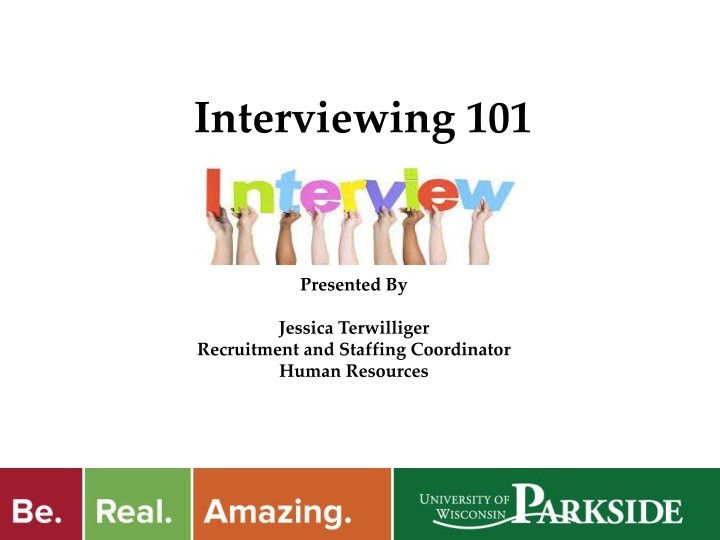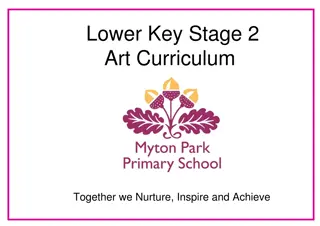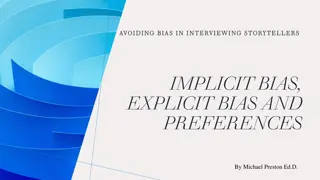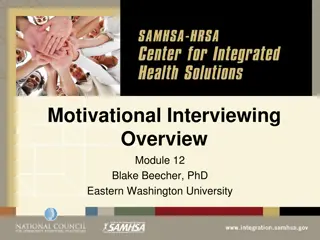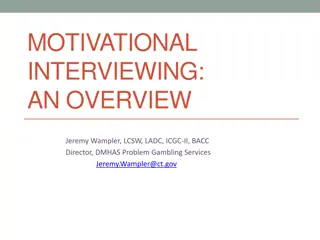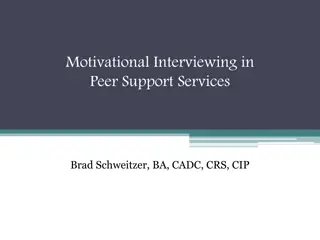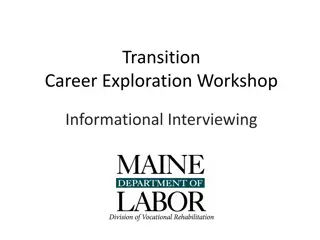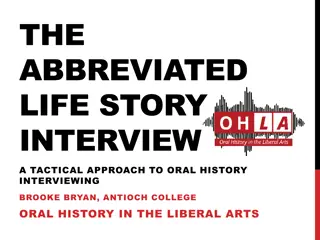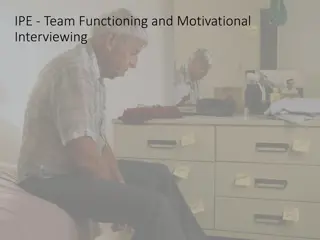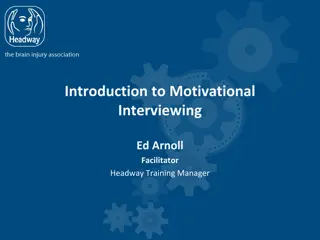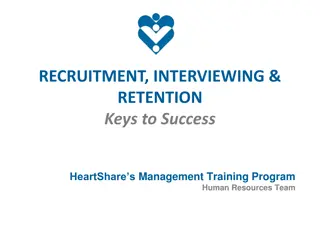Mastering the Art of Interviewing: Strategies for Success
Discover the key elements of a successful interview including avoiding common hiring mistakes, assessing candidates' compatibility, and utilizing behavioral interview techniques. Learn how to evaluate candidates' desire factor, ask compelling questions, and identify desirable behaviors through real-life scenarios. Enhance your interviewing skills to find the best talent for your organization.
Download Presentation

Please find below an Image/Link to download the presentation.
The content on the website is provided AS IS for your information and personal use only. It may not be sold, licensed, or shared on other websites without obtaining consent from the author.If you encounter any issues during the download, it is possible that the publisher has removed the file from their server.
You are allowed to download the files provided on this website for personal or commercial use, subject to the condition that they are used lawfully. All files are the property of their respective owners.
The content on the website is provided AS IS for your information and personal use only. It may not be sold, licensed, or shared on other websites without obtaining consent from the author.
E N D
Presentation Transcript
Interviewing 101 Presented By Jessica Terwilliger Recruitment and Staffing Coordinator Human Resources
Key to a good interview The key to a good interview will always lie in your ability to avoid common hiring mistakes and assess potential talent in the interview process. But keep in mind that more new hires fail due to personality-culture mismatch than technical skills mismatch, so keep a keen eye out for compatible styles in terms of communication, pace, constructive criticism, and work hour commitments in candidates responses.
Assess the Candidates Desire Factor Did the candidate research your company, its achievements, competitors, and challenges prior to an interview. Still, some will go out of their way to articulate their understanding of who you are and why they re so excited about joining your firm. Try questions like these to isolate those who are hungriest for the opportunity that you offer: Why would you want to work here, and what do you know about our organization? What makes us stand out in your mind from our competitors? How would this role with our company provide a link to your future career progression?
Behavioral Interviews A behavioral question (behavior-based interview questions) is a question that aims at learning about your past behaviors in specific work situations. How you have behaved in certain situations in the past will give them clues on how you ll behave in those same situations when working for them in the future. Tell me about a time .. Situation Behavior Outcome
Common Behavior Based Question Categories Teamwork oriented Problem solving Initiative/Leadership Interpersonal Skills Challenge/stress/pressure
Behavioral Interview Questions Describe a Situation Where You Disagreed With a Supervisor. Tell me about a time you had a conflict at work. Tell me about a situation where you had to solve a difficult problem. Describe a project or idea (not necessarily your own) that was implemented primarily because of your efforts. Do you feel you work well under pressure? If so, describe a time when you have done so Give me an example of a time when you motivated others. Tell me about a time where you had to delegate tasks during a project Give me an example of when you showed initiative and took the lead. Tell me about a time when you missed an obvious solution to a problem. Tell me about your proudest professional accomplishment.
INTERVIEWING QUESTIONS GUIDELINES Category Age Unlawful Lawful How old are you? What is your date of birth? May I see your birth certificate or baptismal records? Have you ever been arrested? On the application, if they did not complete, you can ask them if they are 18 years of age or older? Arrest/Conviction Record If the applicant did not check or complete on the application the criminal record portion, you may ask if they have ever been convicted of a crime. If so, when, where and what was the nature of the crime have them complete Are there any felony charges pending against you? Do you have any commitments that might hinder your attendance at work? Are you available to work the day (or night) shift? Marital Status Are you married, separated, divorced, widowed or single? Have you ever been married, separated, divorced? What is your spouses name and what does he do? Do you have children? Are you male or female? Are you pregnant? Are you planning on having children or more children? Do you use birth control? What is your sexual preference? Are you homosexual, transsexual, lesbian or bisexual? Are you gay? Do you smoke? Do you use tobacco products? Do you drink? Sex None Sexual Orientation None Use of lawful products Quote Companies policy on smoke-free and drug-free environment only
INTERVIEWING QUESTIONS GUIDELINES Category Race Unlawful Lawful What is your race? Are you African-American, Caucasian, Native American, Asian? What race are your parents? Children? Spouse? What religion are you? Do you go to church? For what religious holidays will you be unavailable to work? Does your religion prevent you from working weekends or holidays? Who is your pastor? How tall are you? How much do you weigh? What color is your hair? Do you have any tattoos? Where were you born? May I see your birth certificate? Where were your parents/grandparents born? What is your first language? What language do you speak at home? Are you a naturalized or native-born citizen? When did you become a citizen? Are your parents citizens? Do you intend in becoming an American Citizen? Have you ever declared bankruptcy? Has your pay ever been garnished? Are you obligated to pay child support? Are you receiving public assistance? Do you rent or own your home? Do you own a car? None Religion None Personal Appearance Quote the Dress Code policy if there is one National Origin/Ancestry None Citizenship Are you a U.S. citizen? Are you legally permitted to work in the U.S. Financial Information None
Why A Phone Interview? Phone interviews can be a great method to get knowledge about a candidate before making a decision to get them in for an interview in person. With the help of phone interviews, hiring managers, employers and HR professionals are able to improve their opportunities of discovering the ideal employee by finding out candidates that stand out and filtering out those who are not the right fit even before a face to face interview which is particularly time consuming. Follow below tips for conducting phone interviews effectively.
Lets Get Started 1. Get all the tools ready: Make sure you have consistent and good connection, if recording do a test run. Do maintain a notebook, pen and other noting tools. Make sure you have the phone number and any other contact details with you. 2. Prepare: It is important to learn about a candidate as much as possible prior to an interview. You should have in front of you: the resume and any additional details that have been provided, through online application or such. Even make sure that you have the description in front of you of the job title you are hiring for, to ask them questions related to the experience they have mentioned in the provided information. 3. Know your interview questions in advance: Know what you wish to ask and generate questions to ask at interview to acquire complete knowledge about the candidate. Keep it short and direct.
4. Send the candidate complete details: Make the preparation for the candidate easy, for the interview send them complete details about the company, of the people they will be speaking to and the related phone numbers. Sharing the plan can be beneficial and helpful as well. 5. Avoid distractions: Phone interviewing is not the moment where you can text message someone or can check e-mails. You need to eliminate any kind of distractions that you are aware can disturb you and try to focus on the interview. 6. Avoid talking too much: A number of people are comfortable speaking in person and some on the phone. You must maintain the face to face interview principles, ask short questions and listen to the candidate throughout. This is a filtering system for both candidate and the interviewer. Keep it short and detailed so that you leave room for the in person interview to ask more questions.
7. Plan a structure for the interview: It is good to have a structure for the interview, so that you do not miss out on anything, ask all the questions you wished to ask and give the candidate time for questions. 8. Create checklist: You can even create a checklist to make sure you are on track with the structure you have prepared. It will even help you to not miss out on any part during the phone call. As you gradually conduct and get done with each step you can mark off the step from the list. Note taking is also a great idea. 9. Ideal Structure: The ideal structure for an interview can be by starting with an introduction of you or anyone else that may be involved in the call and then follow by thanking them for their time and look for any initial concerns. Provide them with a short but sufficient introduction about the company and the role and then let them give overview about themselves. Have a transparent discussion with opportunities to clear all concerns and close it with providing details about further actions.
10. Be Ready for the unexpected: Job seekers may never know when the Interviewer may ask them certain question that will be unique and odd during an interview. It goes the same for that Interviewer as the candidate during the phone interview might pop up some question out of the ordinary or says something alarming or surprising. Preparing for job interview in advance will be beneficial to give away the right and appropriate answer to any rare situations arising. 11. Maintain flexibility: An interview is a two way process. It is as crucial to selling you and the job as much it is about assessing the candidate s eligibility. Competent candidates will have numerous offers and options to choose from and hence be flexible from the beginning itself to make it painless for them to speak to you.
Interviewing Tips for the Interviewer Have your list of questions prepared Use those behavioral questions Review the candidates Resume/credentials Extend professional courtesies, ex water.. Watch those nonverbal signals Keep polite and professional Follow up
Choose who you would like to offer! Evaluate specific evidence which the candidate shared, be sure you are not bringing in any biases Gage there behavioral traits and skills Avoid the charisma trap High value on attitude, work ethic and motivation Learn from your personal past hiring processes
Why the Right Hire is Important Replacement of an employee can range from two to seven times his/her salary
